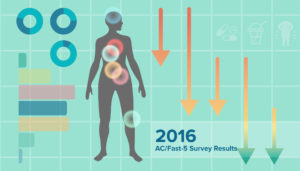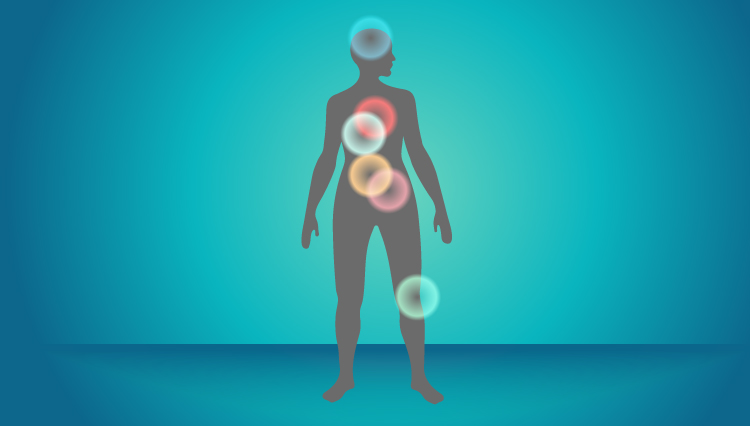Reason for Optimism
Beyond the clamor of wild claims, infotainment “miracles” and the booming $148 billion weight loss management market, a worldwide community of weight loss success stories has grown organically under the radar since 2005.

The community of appetite correction (AC)/Fast-5 lifestyle adopters has achieved sustained weight loss with relative ease and without hardship, relentless hunger or white-knuckle willpower. Over 300 people from this community, who have maintained the AC/Fast-5 lifestyle for up to ten years, completed the first AC/Fast-5 survey.
The survey results constitute an antidote to the shock wave of fear and futility emanating from the NY Times biggest loser article that suggested people struggling with weight gain should capitulate until a drug breakthrough rescues them from their flawed bodies.
Survey Results
The survey results are summarized in infographics linked below that include background on the scale of the obesity problem.
People who had practiced an AC/Fast-5 lifestyle for a year or more lost an average of 53 pounds, or 23 percent of body weight. Excellent results are typical and 70 percent of survey respondents had reached at least one weight category below their starting point, moving from morbidly obese to obese, obese to overweight, or overweight to healthy weight. The largest loss reported was over 200 pounds. As compelling as the data is, the comments returned with the survey responses say even more:
GS: “I have maintained my 80 pound loss for over a year now, and I have confidence that this is forever.”
RH: “Most effective and easy fat loss program I’ve ever used.”
KC: “My social life has improved. I can now join friends and colleagues at business dinners and happy hours without being concerned that my body will need three days to lose the associated bloat. I used to decline these dinners. Now I comfortably eat out three evenings a week and am losing weight. My skin is glowing.”
EL: “Freedom from hunger; so grateful not to be hungry all the time, feel much lighter, finally have a lifetime solution after a lifetime search.”
Understanding the Frustration
To put these survey results in perspective, it’s helpful to be aware of the overweight person’s plight and the marketing machines that take advantage of their misfortune.
Bias against overweight and obese people ranges from misconceptions about willpower, weakness and motivation to aggressive hatred that defies rational explanation. It extends beyond the general populace to professional arenas as well. A 2012 study demonstrated that strong anti-fat bias is as pervasive among doctors as it is among the general public and in a 2016 report some doctors reported that their bias impacts patient treatment. Short on effective solutions, doctors say, “You need to lose weight.” When dieting fails, they disrespect patients and label them as noncompliant.
Overweight and obese people endure daily stigmatization and many have depleted their willpower in repeated attempts on non-sustainable diets. When they look to their doctor for a solution, they leave empty handed, judged and demoralized. They shoulder the blame for exacerbating the world’s financial woes and now, in the aftermath of the biggest loser heartbreak, they confront a slew of pessimistic expert opinions such as “the only way to maintain weight loss is to be hungry all the time.” Against those odds, who wouldn’t despair?
Overcoming the appetite center’s hunger signal with white-knuckle willpower can work for a while, sometimes for years, as in the case of Tony Posnanski, but eventually willpower wanes. Even tips for enhancing willpower reserve offer little long-term success. Obese people fight their appetites and deal with persistent fears, such as these:
- waking up at 2AM fighting the urge to raid the refrigerator
- meeting the pizza delivery person at the sidewalk to hide my eating from my family
- facing the scale after denying my favorite foods for weeks only to have caved last night
- passing up the pastry in the office break room only to struggle to shake off the lingering want
- making the umteenth New Year’s weight loss resolution knowing it will end poorly
- dropping 50 pounds of fat knowing the yo-yo is bound to come back up
Monetizing the Misery
As the battle for new recruit business wages more fiercely than ever before, you can count on Weight Watchers and other heavyweights in the weight loss management market to up their marketing game. Industry leaders have dressed up the same old short-term fixes and put $100 million into television advertising to capitalize on the consumer mindset’s shift away from diet and toward health.
The empty noise that their advertising generates does more than feed the fears of obese and overweight people on the promises of hope—it drowns out the voices of those who have discovered how to achieve long-term weight loss without hardship. It cheats people who are desperately searching for an answer out of the opportunity to learn about appetite correction.
Background of Fast-5 and AC
Dr. Bert wrote The Fast-5 Diet and the Fast-5 Lifestyle (available as a free download) in 2005. Early adopters began to enjoy the benefits of the Fast-5 lifestyle including simplicity, freedom, power and control over food and sustained weight loss without hunger or suffering. The AC/Fast-5 lifestyle spread worldwide by word of mouth and gained some momentum with the rise of social media.
Scientific evidence that supports Fast-5 as a healthy option has been around since 1934, but since 2005, research on fasting as a healthy option has expanded by leaps and bounds.
Seven years after the release of The Fast-5 Diet and the Fast-5 Lifestyle, the August 2012 BBC release of Eat, Fast and Live Longer launched the idea of intermittent fasting (IF) into mainstream awareness. In 2015, Dr. Bert launched an expanded guide, AC: The Power of Appetite Correction based on ten years of user experience, troubleshooting and feedback.
Opportunity Knocks
What if we could transform the prevailing fear of obesity and its costs into optimism before the January 2017 diet season? What if the experts have overlooked this breakthrough because they don’t appreciate how quickly people can adapt to going without food for several hours, or because it’s a solution they can’t patent and monetize? Each overweight or obese person can determine for themselves whether it’s a breakthrough if they know about it.
The information is here. The cost is nothing. Please share.
![[INFOGRAPHIC] 2016 AC/Fast-5 Survey Results](https://www.bertherring.com/wp-content/uploads/2015/12/Fast-5-infographic-email-01.jpg)

![[INFOGRAPHIC] 2016 AC/Fast-5 Survey Results](https://www.bertherring.com/wp-content/uploads/2016/05/facebook-feat-01-1.jpg)
